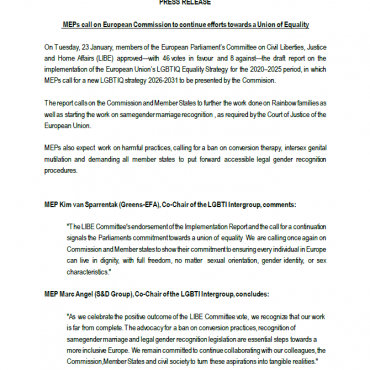Strasbourg Court: Russian ‘anti-propaganda’ law is discriminatory and violates human rights
Yesterday, the European Court of Human Rights ruled that Russia’s ‘anti-propaganda’ legislation is in breach with human rights.
 The federal law was adopted in 2013 and bans the “promotion” or “propaganda” of homosexuality, bisexuality and transgenderism.
The federal law was adopted in 2013 and bans the “promotion” or “propaganda” of homosexuality, bisexuality and transgenderism.
The Court found that the law breaches the right to freedom of expression (Article 10) and the prohibition of discrimination (Article 14).
The Court found that although the laws in question aimed primarily at protecting minors, the limits of those laws had not been clearly defined and their application had been arbitrary. Furthermore, it held that “by adopting such laws the authorities reinforce stigma and prejudice and encourage homophobia, which is incompatible with the notions of equality, pluralism and tolerance inherent in a democratic society.”
Co-Chair of the European Parliament’s LGBTI Intergroup, Daniele Viotti MEP, reacted: “It is wonderful news that the Court confirmed what everyone warned Russian lawmakers about four years ago: this law is discriminatory towards LGBTI people, and limits freedom of expression.”
“Russian authorities should now withdraw the law, and end the systematic crackdown on LGBTI organisations and civil society in general.”
Vice-chair of the European Parliament Intergroup on LGBTI Rights, Sophie in ‘t Veld MEP, reacted: “The judgment is an important precedent in the European context, establishing that laws may never discriminate against a specific group of people. We should also look at EU Member States: Lithuania’s anti-propaganda law, which is similar to the Russian one, is still in place, while the European Commission refuses to step in.”
“Lithuania is having no regard to human rights, which are at the heart of the European project. This is unacceptable. It is time for the European Commission to protect the rights of all Lithuanians, including lesbian, gay, bisexual, trans and intersex Lithuanians. They should ensure that this case law is also implemented in the EU context.”
Read more
- Read the press release from the European Court of Human Rights on Bayev and others v. Russia
- Read more posts regarding Russia
- Read more posts regarding Lithuania






